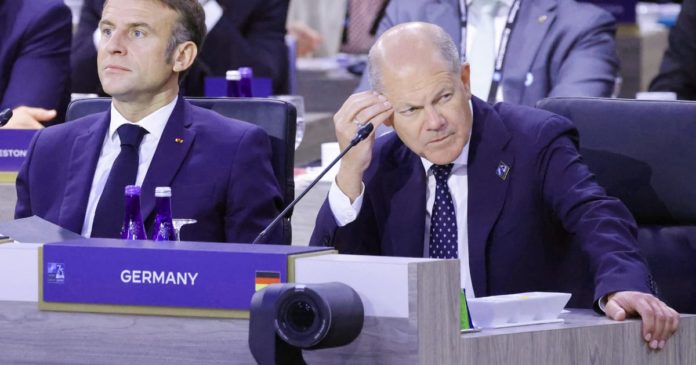The clash dramatizes the dilemma facing the bloc’s 27 governments at a highly sensitive moment for global trade. The U.S. presidential election is on a knife edge and could see Donald Trump reelected in one month’s time. He has past form playing hardball with the EU on trade and has proposed sweeping new tariffs if he wins back the White House for the Republicans.
But even Democrat Joe Biden’s presidency has taken American policy in a protectionist direction, prioritizing domestic firms for hundreds of billions of dollars worth of industrial investment and tempting European companies to relocate to the U.S.
With China increasingly assertive especially in critical new carbon-neutral technology and supply chains, the EU has some choices to make if it wants to compete. Those decisions will require a large degree of consensus from national leaders. And the bloc’s two biggest powers can’t seem to agree.
At the Berlin Global Dialogue on Wednesday, Scholz and Macron shook hands, smiled warmly and then spent the day offering wildly different takes on what Europe must do next. They diverged on key topics including proposals for joint EU borrowing, duties on imports of Chinese vehicles and trade talks with South American countries.
During a Q&A at the event, Macron hinted at his difficulties with Scholz when he was asked whether he would be able to convince Berlin to issue joint EU debt, as proposed in an official report by former Italian PM Mario Draghi. The French leader laughed and said the last time it happened had been in response to the pandemic, with some help from “a colleague called Covid-19.”
Macron and Scholz discussed the Draghi report on Europe’s competitiveness, which will be on the agenda of the next European Council summit. Officially, both Paris and Berlin say they agree with Draghi. But, in reality, they disagree on the proposed new wave of joint EU borrowing to invest in strategic sectors and rival China and the U.S. While France has often called for new EU debt and for repeating the experience of the post-pandemic recovery plan, for Germany that’s a no-go.


